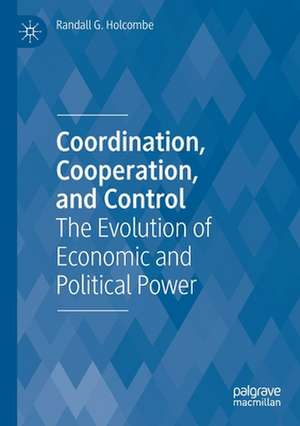Coordination, Cooperation, and Control: The Evolution of Economic and Political Power
Autor Randall G. Holcombeen Limba Engleză Paperback – 25 iul 2021
| Toate formatele și edițiile | Preț | Express |
|---|---|---|
| Paperback (1) | 640.06 lei 6-8 săpt. | |
| Springer International Publishing – 25 iul 2021 | 640.06 lei 6-8 săpt. | |
| Hardback (1) | 645.47 lei 6-8 săpt. | |
| Springer International Publishing – 24 iul 2020 | 645.47 lei 6-8 săpt. |
Preț: 640.06 lei
Preț vechi: 753.01 lei
-15% Nou
Puncte Express: 960
Preț estimativ în valută:
122.49€ • 127.41$ • 101.12£
122.49€ • 127.41$ • 101.12£
Carte tipărită la comandă
Livrare economică 12-26 aprilie
Preluare comenzi: 021 569.72.76
Specificații
ISBN-13: 9783030486693
ISBN-10: 3030486699
Pagini: 328
Ilustrații: XII, 328 p.
Dimensiuni: 148 x 210 mm
Greutate: 0.41 kg
Ediția:1st ed. 2020
Editura: Springer International Publishing
Colecția Palgrave Macmillan
Locul publicării:Cham, Switzerland
ISBN-10: 3030486699
Pagini: 328
Ilustrații: XII, 328 p.
Dimensiuni: 148 x 210 mm
Greutate: 0.41 kg
Ediția:1st ed. 2020
Editura: Springer International Publishing
Colecția Palgrave Macmillan
Locul publicării:Cham, Switzerland
Cuprins
1. The Concept of Power.- 2. Political Power.- 3. Economic Power.- 4. The Separation of Economic from Political Power.- 5. Power in Pre-Agricultural Societies.- 6. Power in Agrarian and Feudal Societies.- 7. Institutions That Support Commerce and Industry.- 8. Power in Commercial and Industrial Societies.- 9. Politics as a Vocation.- 10. The Social Contract.- 11. Ideology, Politics, and Power.- 12. Clouds on the Horizon: The Recombination of Political and Economic Power.- 13. Progress and Power.
Recenzii
“Holcombe’s book offers a thorough treatment of the concept of power, and it is an important resource for scholars of political economy and public choice theory. Moreover, the material is presented in a way that is accessible to those that do not have strong background in the social sciences. The book can also be a valuable reference for graduate and undergraduate courses … .” (Vaios Koliofotis, Erasmus Journal for Philosophy and Economics, Vol. 15 (1), 2022)
"This is a terrifc book. … Holcombe has been a leader in attempting that redirection back toward foundations, and this book advances that program still further.” (Michael Munger, Public Choice, Vol. 188, 2021)
Notă biografică
Randall G. Holcombe is DeVoe Moore Professor of Economics at Florida State University, USA. Holcombe is also Senior Fellow at the James Madison Institute and a Research Fellow at the Independent Institute in Oakland, California. He served on Florida Governor Jeb Bush’s Council of Economic Advisors from 2000 to 2006 and is past president of the Public Choice Society and the Society for the Development of Austrian Economics. Holcombe is the author of fifteen books and more than 200 articles published in academic and professional journals.
Textul de pe ultima copertă
There are two ways people coordinate their actions: through cooperation, exercised by economic power, and through control, exercised by political power. When economic and political power are held by the same people, the result is stagnation; when those who hold economic power are not the same people who hold political power, the result is progress. This book presents the ways in which economic power and political power can be separated, and how they can remain so, by analyzing the nature of power and the differences between economic and political power. The book then discusses the history of economic and political power, including hunter-gatherer societies, agrarian societies, and modern commercial and industrial societies. This background lends insight into why political and economic power were typically held by the same people, and why recently those without political power have been able to acquire economic power. Incentives play a key role in understanding how those two types of power can become separated, and why there is always a tendency for them to recombine. But ideas also play a crucial role, including the influence of the Enlightenment, on the progress that has occurred in the last several hundred years.
Caracteristici
Provides a theoretical understanding of power and then applies that framework to a variety of historical cases Attributes economic progress to the separation of economic from political power Draws on historical and anthropological evidence on the evolution of power from sociology and political science
